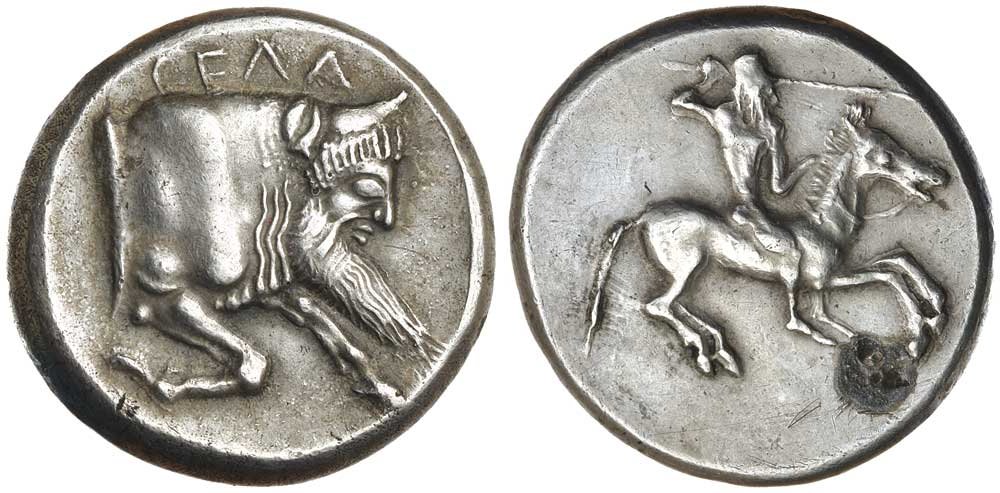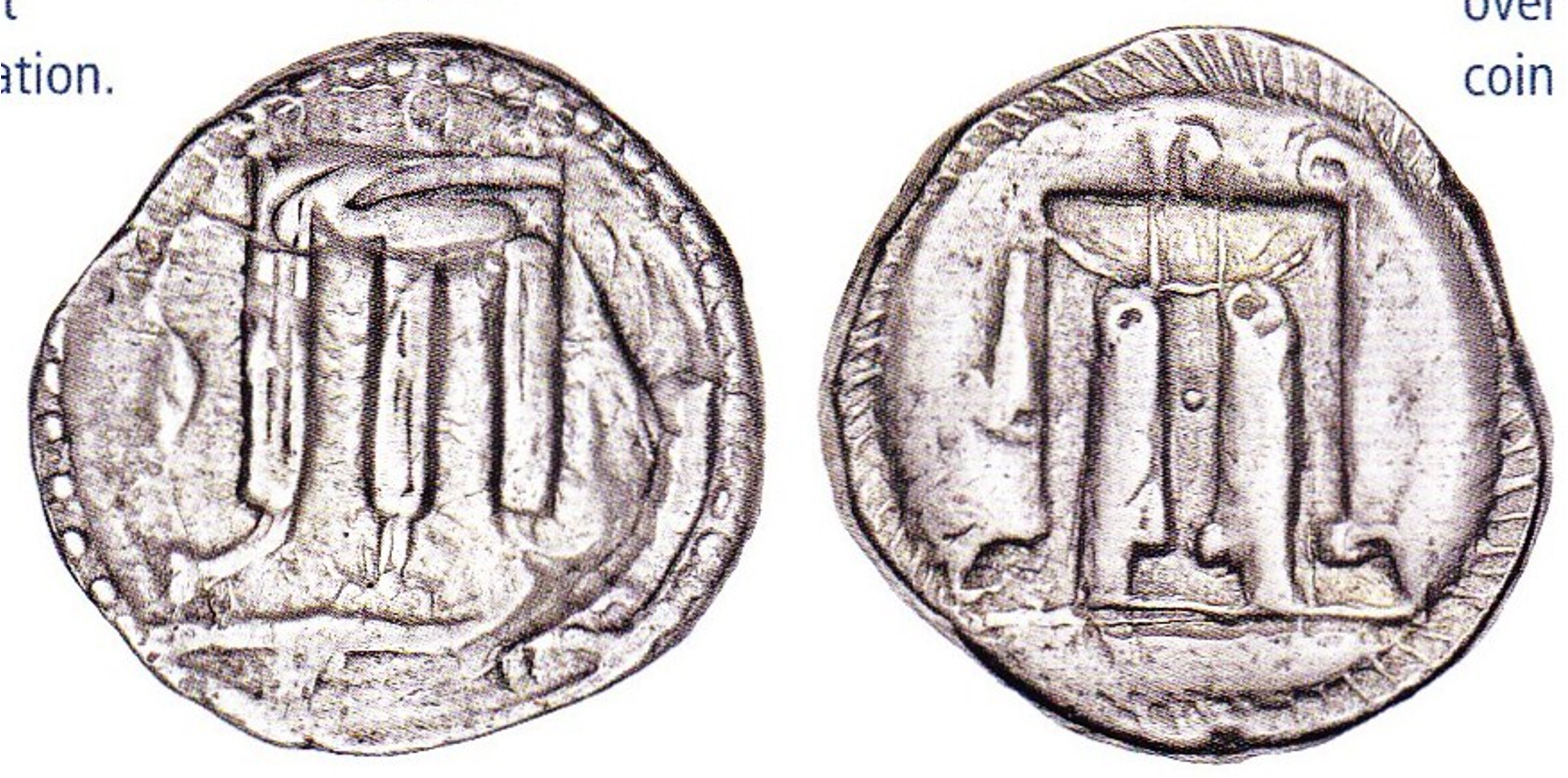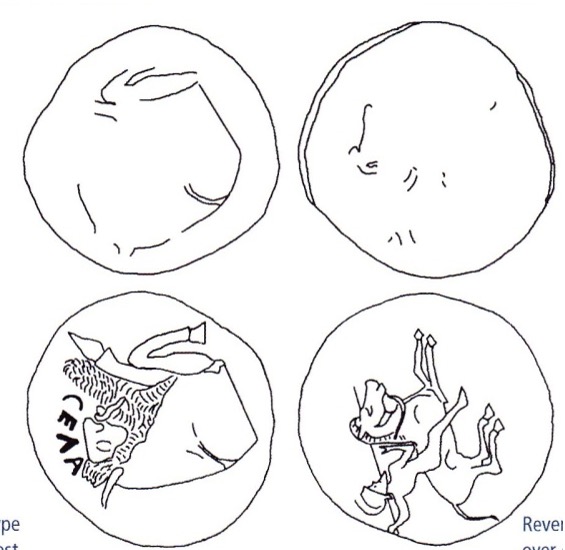2161 - Croton (nomos tripod/incuse tripod) over Gela (man-faced bull/horseman) (MacDonald coll., 27)
From SILVER
480 BCE - 430 BCEϘPO
Images
Overstruck variety Traces of the overstruck variety
Traces of the overstruck variety

Gela 490 BCE.jpeg [1]
Location/history
| Private collection(s)Private collection(s) ᵖ: | David MacDonald collection, 27 |
Overstriking coin
Description
| ObverseInscription or printing placed on the obverse.: | ϘPO (Greek) Tripod. In left field, marsh-bird standing right. Border of dots. | ReverseInscription or printing placed on the reverse.: | Tripod. Hatching border (incuse) |
Mint and issuing power
| MintIdentifies the place of manufacture or issue of a numismatic object.: | Croton | Ancient regionAncient region. | Bruttium | Modern countryModern country: Italy | AuthorityIdentifies the issuing power. The authority can be "pretended" when the name or the portrait of X is on the coin but he/she was not the issuing power. It can also be "uncertain" when there is no mention of X on the coin but he/she was the issuing power according to the historical sources: |
Chronology
| FromIdentifies the initial date in a range assigned in a numismatic context. 480 BCE toIdentifies the final date in a range assigned in a numismatic context.. 430 BCE | Classical 480-323 BC |
Physical description
| MetalThe physical material (usually metal) from which an object is made.: Silver |
WeightWeight of the numismatic object (in grams). in grams: 7.957.95 g <br />7,950 mg <br /> | DenominationTerm indicating the value of a numismatic object. Examples: tetradrachm, chalkous, denarius.: nomos | AxisDescribes the directional relationship between the obverse and reverse of a numismatic object.: 1111 mm <br />1.1 cm <br /> |
| StandardStandard.: Achaian | |||
References
| Coin referenceReference of the Coin: | MacDonald 2009, p. 38, n° 27 | Coin series referenceReference to coin series study: | MacDonald 20091MacDonald 2009, p. 38, n° 27, HN Italy2HN Italy, n° 2102, 2104 and 2106, HGC 13HGC 1, n° 1449 |
| Coin series web referenceCoin series web references: | |||
Overstruck type
Description
| ObverseInscription or printing placed on the obverse.: | ΓΕΛΑ (Greek) Forepart of man-headed bull right (visible on obverse: termination of forepart, portions of both forelegs, separation between shoulder and neck, top of neck, trace of face visible under magnification). | ReverseInscription or printing placed on the reverse.: | Horseman riding right, holding spear (visible on reverse: horse's head, other vague traces). |
Mint and issuing power
| MintIdentifies the place of manufacture or issue of a numismatic object. ᵖ: | Gela | Ancient regionAncient region. ᵖ | Sicily | Modern countryModern country: Italy | AuthorityIdentifies the authority in whose name (explicitly or implicitly) a numismatic object was issued. ᵖ: |
Chronology
| FromIdentifies the initial date in a range assigned in a numismatic context. 490 BCE toIdentifies the final date in a range assigned in a numismatic context.. 430 BCE | Archaic until 480 BC |
Physical description
| DenominationTerm indicating the value of a numismatic object. Examples: tetradrachm, chalkous, denarius. ᵖ: | didrachm |
References
| Coin type referenceReference to coin series study ᵖ: | Jenkins 19704Jenkins 1970, p. 162, group 1 |
Additional data
| Frequency of overstrikesFrequency of overstrikes: | rare and concentrated | Level of confidenceLevel of confidence of the identification: | sure |
| RemarksRemarks: | |||
References
- ^ MacDonald, David (2009), Overstruck Greek coins: studies in Greek chronology and monetary theory, Whitman Publishing, Atlanta.
- ^ Rutter N. Keith et alii (eds.) (2001), Historia Numorum Italy, London, xvi, 223 p., 43 pl.
- ^ Hoover, Oliver D. (2018), The Handbook of Greek Coinage Series, Volume 1. Handbook of Coins of Italy and Magna Graecia, Sixth to First Centuries BC., Lancaster-London, 2018, lxi, 527 pages, 23 cm
- ^ Jenkins, Gilbert Kenneth (1970), The Coinage of Gela, AMUGS II, 2 vol., Berlin

